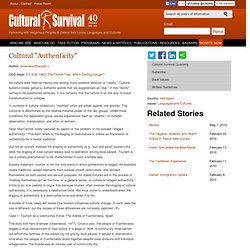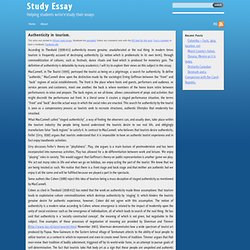

Tourism Glossary. Adventure Travel Company.
Case Studies - Biodiversity and Tourism. Cultural "Authenticity" No culture sees itself as having one among many possible versions of "reality.

" Cultural systems create genuine, authentic worlds that are experienced as "real. " If this "reality" comes to be questioned seriously, it is a certainty that the culture is on the way to major transformation or collapse. Authenticity in tourism. According to Theobald (1998:411) authenticity means genuine, unadulterated or the real thing.

In modern times tourism is frequently accused of destroying authenticity ((a notion which is problematic in its own term), through commoditization of cultures, such as festivals, dance rituals and food which is produced for monetary gain. The definition of authenticity is debatable by many academics; I will try to explore their views on this subject in this essay. MacCannell, in The Tourist (1999), portrayed the tourist as being on a pilgrimage, a search for authenticity. To define “authentic,” MacCannell drew upon the distinction made by the sociologist Erving Goffman between the “front” and “back” regions of social establishments. The front is the place where hosts and guests, performers and audience, or service persons and customers, meet one another; the back is where members of the home team retire between performances to relax and prepare.
Staged authenticity in Brazil. The following concept of “staged authenticity” comes from some tourism studies research I’ve been doing and which is something I encounter in my experiences living in Brazil (especially in Rio).

So what is staged authenticity? “Staged authenticity is when a host community may take something, whether it would be a person, place or thing, a recreate it into something that reflects the traditional values and customs of the people. This could include performances, feasts or even just everyday life.” This really falls under the category of cultural tourism, though I prefer the term “anthropological tourism” (though, technically, that term refers to the anthropology of tourism, I use it to refer to having experiences that reflect reality of the place being visited.)
Marketing. Ecotourism.